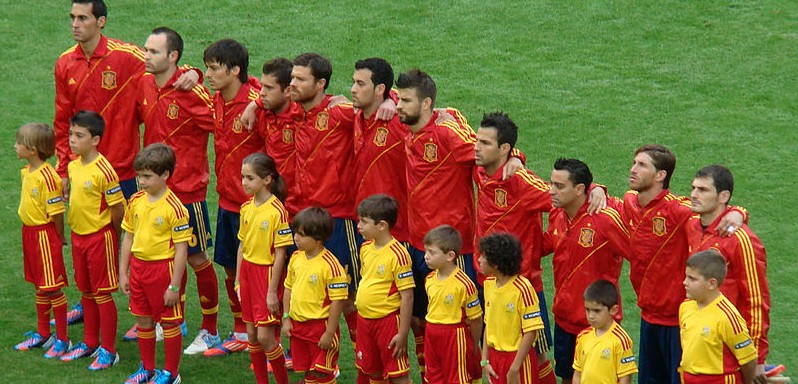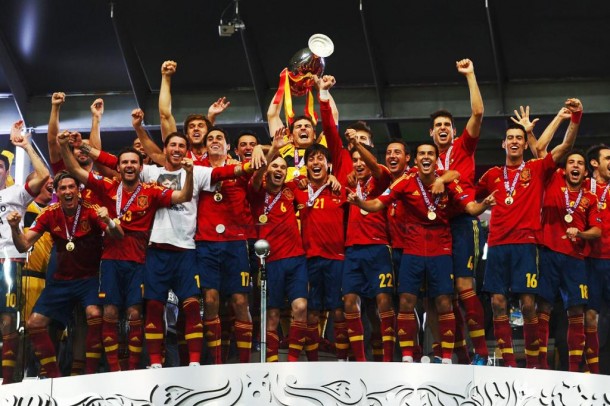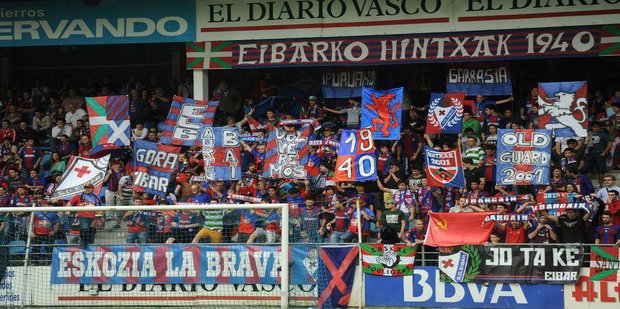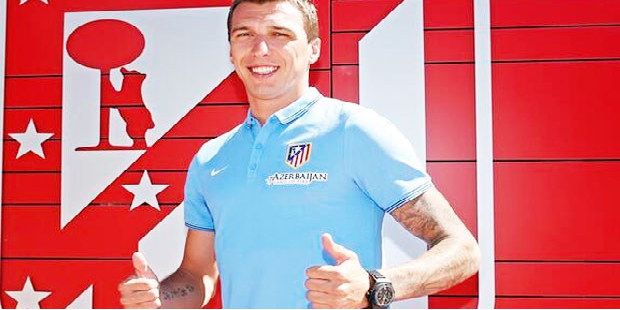- S.D. Eibar ready for maiden La Liga outing
- SD Eibar stengthen ahead of debut La Liga season
- Can ‘Super Mario’ live up to expectations in Madrid?
- MAN IN THE GROUND – Brentford 0 – 4 Osasuna
- Historic Basque derby welcomes S.D. Eibar to La Liga
- Munich to Madrid, via Brazil – Tony Kroos
- Rakitic in Spanish Switch
- Can Spain find redemption in Rio?
- Viva Espana! A season of redemption for Spanish football
- From the old to the new: who can fill the void in years to come for La Roja?
Red Fury! – The meteoric rise of football’s greatest underachievers
- Updated: 7 December, 2012


Photo: Reuters
The past four years have seen Spain’s national football team undergo a dramatic transformation from perennial underachievers to all-but unstoppable thoroughbred champions. Their slick irrepressible passing and the wealth of attacking talent at their disposal, backed by the resilient men at the back make La Roja arguably the greatest side to have played the game. Dig a little deeper however, and it becomes apparent the country’s footballing history is somewhat less impressive
Buffs of the Spanish game will remind you that there was some modicum of success prior to the 2008 European Championship victory; Runners-up at the 1920 Olympic Games, winners of the 1964 European Championship and runners-up in the 1984 tournament. However, it is true to say Spanish football found it difficult to shake of the mantle of Europe’s greatest under achievers.
Having played their first competitive game at international level way back in 1920, it has to be asked why it took so long for Spain to really get the ball rolling?
The national team is freely referred to today as La Furia Española (Spanish Fury), a name that came to prominence during the 1920 Antwerp Olympic Games after a feisty encounter with Sweden saw only 15 men complete the match on both sides. More noticeably yet, was the influence of Basque players. Nine of the 11 men that started the match were Basque, despite earlier calls from the Spanish Federation that Spanish Only players should be selected, an early indication of the political problems surrounding the sport.
Never the less the runners-up medal, came back to Spain, and with it, a new type of expectation not seen before. Spanish football did not become professional until 1926, so as a team of amateurs, a silver medal seemed a great achievement. Do not be fooled into thinking that the Spanish team was lacking in talent due to this, players such as Ricardo Zamora, Josep Samitier and Pichichi made up part of the starting lineup.
The 1924 Paris Olympics was next. Spain had won six out of eight matches on the run up to the Games, building up the nation’s hope, apart from possibly Catalunya, to believe that success could be realized. Spain lost 1-0 to Italy, and with that loss came a period of sorrow that would last decades.
La Furia was to be inherited by General Franco during his dictatorship, using the team as a propaganda tool. Franco believed that the passionate, spirited and physical kind of football that Spain employed mirrored his vision of a militaristic macho Catholic society.
Under these shackles the national team would not flourish, nor would it display the kind of free flowing football that comes hand in hand with democracy. The political history of Spain consistently interfered with the football set up, dictating the selection process on political background and not merit.
There are seminal moments in every countries history. A moment that defines a country, for Spain and Spanish football in particular this was probably the death of General Franco. A case has also been made to suggest that the influence of a single Dutchman, Johan Cruyff, was enough to kick start the tiki taka style as it has become known. Perhaps both events have contributed towards the sport finding its feet in Spain, either way we are thankful.
Central to the success of national football in Spain is two of the great centres of football, one in Bilbao in the Basque country the other Barcelona in Catalunya. Two regions that historically would turn their nose up at the idea of Spain, despite this, their success at youth level have bred some of the finest sportsmen to grace our generation. These academies drill technique and precision into the players from a young age, teaching them the value of a well placed first time pass in small sided games rather than hitting the gym.
The investment in youth in Spain is incredible, home-grown talent spring up everywhere every season, so much so that it’s difficult to keep track of Spain’s next big thing leading to the assumption that the next big thing is in fact already here.
Winning the European Championships in 2008 was a huge stepping stone for the national team, which until then had been at odds with the idea of success at a major tournament.
The next step was the World Cup in South Africa in 2010 where they swept aside Holland in a tepid encounter that many suggest was an attempt by Holland to thwart the spectacle which would ultimately play into their hands.
It didn’t. Andres Iniesta the man of the moment sealing back-to-back wins at major tournaments for the first time in Spain’s footballing history.
Up next the European Championships 2012 in Poland and Ukraine where Spain sealed their third major trophy in succession – raising the question as to when this dominance will stop?
A good question as one glance at Europe will tell you that Spanish teams lead the way in almost every sense. The football played by Barcelona is widely believed to be the best in history – apart from the national team itself.
Players such as Isco, Canales and Callejon have now risen to prominence and will join a squad for Brazil 2014 that will feature few big changes. The likes of Xavi Hernandez and Carles Puyol may find time has caught up with them, however, it is difficult to see why the rest of the squad could not make the trip.
What Del Bosque has achieved successfully under the nose of his competitors is to put his team through a transition where-by whole sale changes won’t be necessary for the next tournament. His squad is ready and waiting to be tested again.
These factors raise the all-important question, what can stop Spain?
The players are all hungry for that fourth trophy in a row; the coach is focused on leading his nation further into the history books and putting their names down in Spanish folk law, so the stage is set.
Spain’s revolving door of talent continues to churn out ready-made stars, their muted history now lying dormant in the background of Spanish memory – as much a spectator as we are; all helpless and mesmerized by the wonder that is the future of La Roja.
Follow @icentrocampista






You must be logged in to post a comment Login